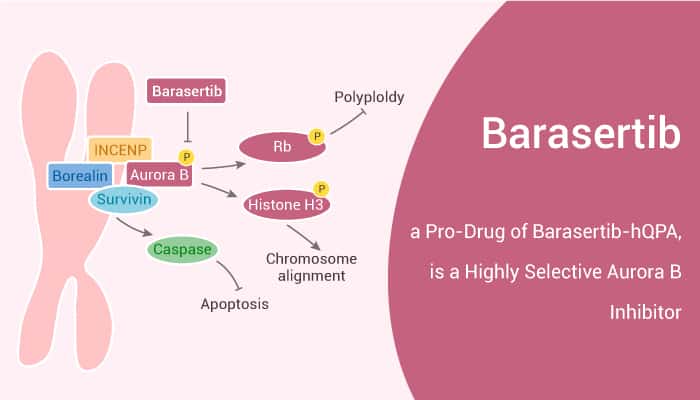Aurora kinases play an important role during mitosis for chromosome alignment, segregation, and cytokinesis. Selective Targeting of Aurora B kinase may be a promising therapeutic approach for the treatment of a range of malignancies. In this study, researchers explored the effect of Barasertib. In particular, Barasertib is a highly selective inhibitor of Aurora B kinase, on various types of human leukemia cells.

Barasertib is a prodrug of AZD1152-HQPA. Moreover, AZD1152-HQPA is a specific inhibitor of Aurora kinase, with selectivity for Aurora B. Especially, AZD1152-HQPA inhibits Aurora B and A kinases with IC50s of 0.37 nM and 1368 nM, respectively. Furthermore, AZD1152-HQPA (1-10 nM) inhibits the clonogenic growth of MOLM13 and MV4-11 cells with IC50s of 1 and 2.8 nM, respectively.
Barasertib inhibits the proliferation of acute myeloid leukemia lines, acute lymphoblastic leukemia line, leukemia, acute eosinophilic leukemia, and the blast crisis of chronic myeloid leukemia K562 cells with an IC50s of 3-40 nM. Also, Barasertib (3 μM, 3 hours) decreases the expression of the phosphorylated forms of histone H3 in freshly isolated leukemia cells. Of note, Barasertib synergistically increases the antiproliferative activity of Vincristine and Daunorubicin. Vincristine is a tubulin depolymerizing agent. Daunorubicin is a topoisomerase II inhibitor. Furthermore, Barasertib potentiates the action of Vincristine and Daunorubicin in a MOLM13 murine xenograft model.
Taken together, AZD1152 rapidly affects the growth and survival of human acute myeloid leukemia cells in vitro and in vivo. Barasertib is a promising agent for the treatment of leukemia.